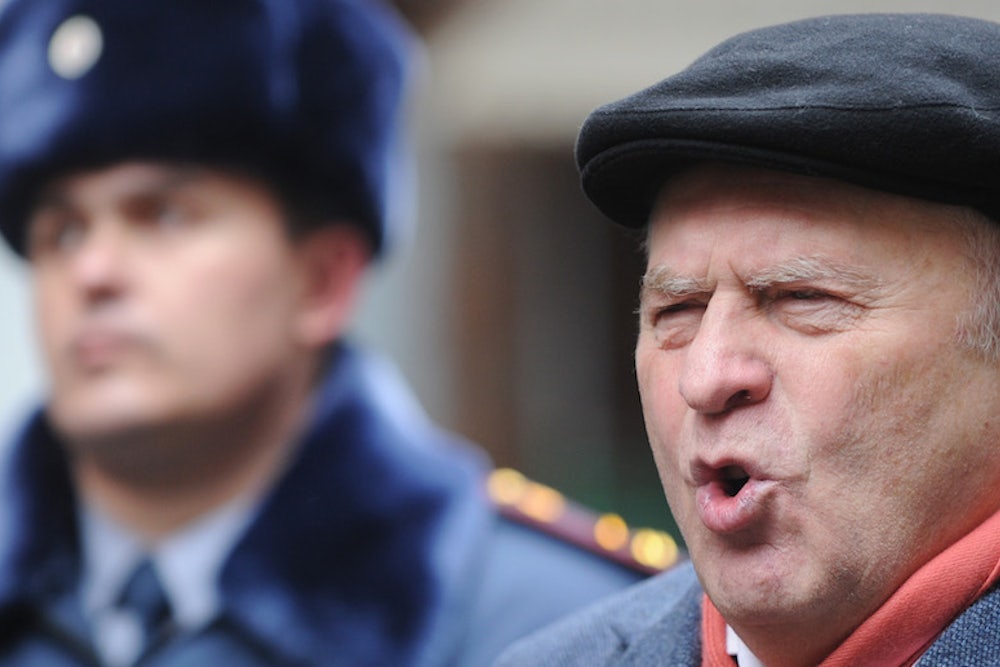Since the beginning of the Ukrainian revolution last fall, Russian television has strayed rather far from the truth. At first, the demonstrations in favor of Ukraine’s European course were ignored, and then presented as a matter of hundreds or thousands of people—instead of hundreds of thousands. When the fact and the size of the protests could no longer be denied, Ukrainian protesters were slandered as fascists, while the leaders of the three major opposition parties were labeled gay.
The recent and perplexing obsession with sexual orientation in Russia has less resonance in Ukraine. But as protests became revolution, and revolution brought a new government that Russia opposes, we in Ukraine now hear a new slander: that all of us are fascists and Nazis. On March 24, Dmitry Rogozin1, a deputy prime minister in the Russian government, tweeted the following: “I still can’t understand where this rot came from. We [Russians and Ukrainians] were born in one and the same country, we sang one and the same anthem … We went to the same schools and now … Almost no one left but Nazis [in Ukraine].” This is a lie that is intolerable to all of us, regardless of whether we joined the protests at the Maidan.
If you ask anyone in Kiev about the people who were protesting at the Maidan during the last few months, they will tell you that there were students, architects, doctors, businessmen, construction workers, computer programmers, engineers, film directors, lawyers, secretaries, farmers, even Ukrainian celebrities famous in Russia. There were Ukrainians, of course, but also Russians, Belarusians, Jews, Azerbaijanis, Georgians, Poles. George Sayevich, a Ukrainian-American retired journalist and interpreter currently living in the United States, also came to Maidan in February. He was brutally beaten by police, like so many others.
Getting to the truth about Ukraine is not easy, but one thing is clear: Do not watch Russian television if you want some semblance of it. Perhaps the most vivid propagandist on Russian television, especially these last few weeks, is Vladimir Zhirinovsky, the vice chairman of the Russian Duma, who recently proposed to divide Ukraine between Russia, Poland, Romania, and Hungary. Most Ukrainians and a lot of Russians as well have long considered Zhirinovsky a fool for his tendency to make exceedingly strange proposals. He has advocated, for example, that Russia seize Alaska and use it as a deportation dumping ground for Ukrainians. Not long ago, he claimed that a meteor shower was a test of a new American weapon.
These days, Zhirinovsky is no less surreal in his predictions—but we find ourselves wondering if there just might be a suggestion of Russian policy in his pronouncements. “If you want presidential elections in Ukraine,” he said on Russian television, “you want fascists to win them.” There is a certain twisted logic to this. Russian policy in Ukraine is based upon the strange premise that only Russia can protect the world from Ukrainian fascism. (In fact the opposite is true: The only way radicals in Ukraine would have a chance is if Russia continues its invasion of the country.)
What Russia finds threatening, it seems, is the prospect of normal democratic elections in neighboring Ukraine this coming May. In his own special way, Zhirinovsky confirms this. Referring to the deposed president of the country, whose last act was the killing of his own people, Zhirinovsky says that Yanukovych will return to Kiev—as a birthday present for Zhirinovsky, in April. “He’s going to come back with tanks, amphibious aircraft etc. There will be no presidential elections in May. There will be mass arrests, the government will be thrown to jail, they will be tried for treason and shot. Gallows will stand in Kiev on Maidan, right where they overthrew the government. The ones who will survive will be sent to Magadan” in the Russian Far East—a reference to the Gulag.
Dmitry Kiselyov, probably the single most influential person in the Russian mass media, considered by many as the Kremlin’s chief propagandist, provides another distinctive voice on Russian television. He is best known in the West for his idea that the internal organs of gays were not fit for donation and, more recently, for his reminder that Russia could turn America into “radioactive ash.” Here is his characterization of life in Ukraine these days: “There are over forty-five million people living in Ukraine. Each of them is a traitor to the other. Because they are forty-five million people who see each other as traitors. Because everyone is against everyone there. Everything is so divided. It’s a horrible situation. It’s a real mass psychosis. And I’m so sorry that things like these happen in a fraternal country.”
Ukrainians have been under massive pressure for months. Protesters are traumatized by the memory of their friends’ deaths. Other Ukrainians, who are still learning about the tragic events, are experiencing subsequent distress. We are following the news of kidnappings and torture in Russian-occupied Crimea. Russian politicians and our former president speak openly of dismembering the rest of the country. And as if that were not enough, the army of Russia is now massed at Ukraine’s eastern border. We are digging trenches. A “fraternal country,” in the old Soviet lexicon all Russians and Ukrainians know, is one that is about to be granted “fraternal assistance,” which means invasion.
And yet, despite all of this, the Ukrainian government, like the vast majority of Ukrainian citizens, is behaving with remarkable calm. I cannot help but feel that it is the Russian propagandists, and anyone out there who takes them seriously, who are enduring the mass psychosis.
We will leave aside the fact that Rogozin is himself a nationalist. His political party was once barred from Moscow’s municipal elections because of racist campaign propaganda—in particular for an ad in which Rogozin himself suggested that it was time to clean Russia’s cities of dark-skinned people.
